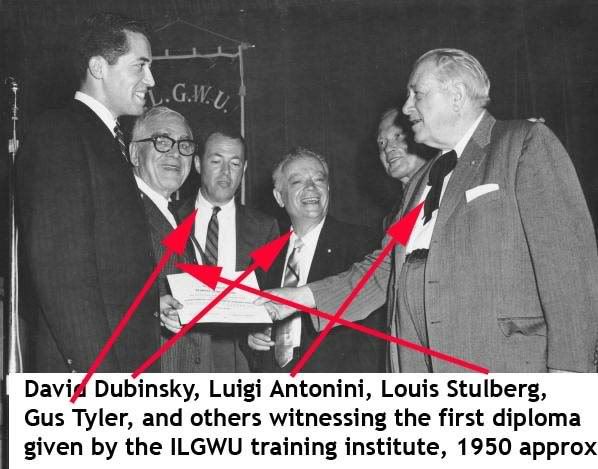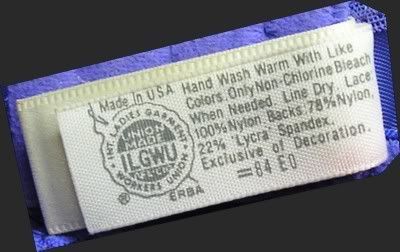
 Some background on the Union Label campaign and an excerpt from an article from the Forward by Gus Tyler, who's still going strong at 95: In 1958, the ILGWU and New York dress manufacturers signed an historic contract which mandated the manufacturers' insertion of the union's label and the union's sponsorship of a two million dollar campaign to promote labeled products. Between 1959 and 1975, the ILGWU used multiple media to promote its label, focusing on television advertising after that period. This study determined the rationale for ILGWU's promotional targeting of retailers and consumers between 1959 and 1975, as well as messages designed for these audiences and means used to reach them. Primary sources used included materials in ILGWU Archives, union documents, and contemporary periodicals. The union advertised in local newspapers, consumer magazines and Women's Wear Daily, and produced and distributed booklets, films and varied press aids about apparel. Two themes dominated the campaign: (a) the ILGWU's contributions to American society and (b) the excitement of American fashion.
Some background on the Union Label campaign and an excerpt from an article from the Forward by Gus Tyler, who's still going strong at 95: In 1958, the ILGWU and New York dress manufacturers signed an historic contract which mandated the manufacturers' insertion of the union's label and the union's sponsorship of a two million dollar campaign to promote labeled products. Between 1959 and 1975, the ILGWU used multiple media to promote its label, focusing on television advertising after that period. This study determined the rationale for ILGWU's promotional targeting of retailers and consumers between 1959 and 1975, as well as messages designed for these audiences and means used to reach them. Primary sources used included materials in ILGWU Archives, union documents, and contemporary periodicals. The union advertised in local newspapers, consumer magazines and Women's Wear Daily, and produced and distributed booklets, films and varied press aids about apparel. Two themes dominated the campaign: (a) the ILGWU's contributions to American society and (b) the excitement of American fashion.My 75 Years at the Forward, From East Broadway to the Blogosphere
Tyler, Too
By Gus Tyler
Fri. Jan 05, 2007
This issue is the first of 2007, the Forward’s 110th anniversary year. It is a personal landmark for me, too: the 75th anniversary of my own association with the Forward. Over the years, I’ve gone from a young editorial assistant to a senior commentator. I’ve worked in print, broadcast and now on the Internet, riding the successive waves of the media age. Looking back, I’m struck by the evolution I have witnessed in the communications media and the resulting changes in our American democracy. I joined the Forward in 1932, the year of my graduation from New York University. Louis Schaefer, the labor editor of the Jewish Daily Forverts, asked me to meet him at the famous Forward Building at 175 East Broadway. He knew of me because I was the editor of Free Youth, the publication of the Young People’s Socialist League. I was all of 21. When I got to his office, he asked me to be his assistant. He offered me a salary of $15 a week — which, in those days, was money.
The Jewish Daily Forward had been founded 35 years earlier to serve as a voice of democratic socialism among the Yiddish-speaking immigrants. By 1932 it was the largest of the Yiddish dailies, with a circulation of a quarter-million nationwide. It was also a major force in the rapidly growing American labor movement.






No comments:
Post a Comment